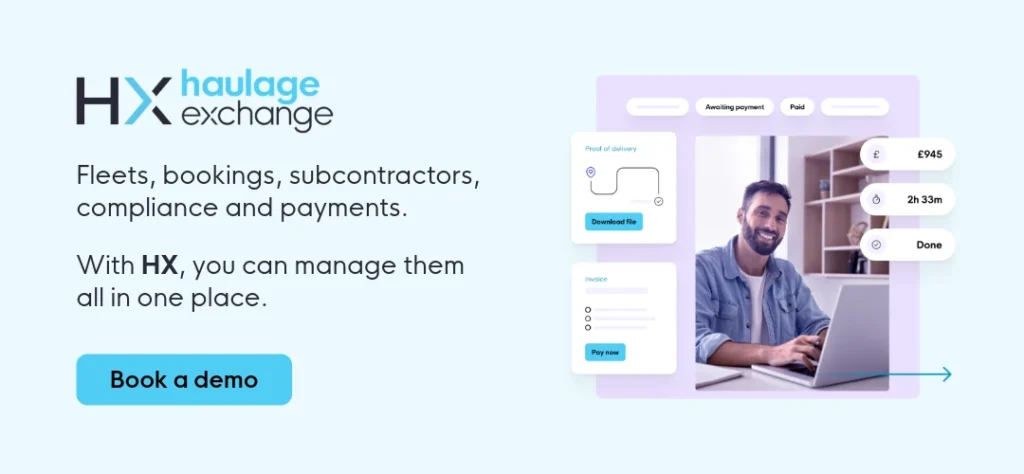Thinking about a career move into freight brokering? Whether you’re already in logistics or starting fresh, becoming a freight broker in the UK opens up a world of opportunity.
In this guide, we’ll break down everything you need to know, from what the role involves to setting up your own freight brokerage business.
What we’ll cover
Fleets, bookings, subcontractors, compliance & payments.
With HX, you can manage them all in one place.
What is a freight broker?
A freight broker is a middleman between shippers who need to move goods and carriers who can transport them.
They don’t handle the freight directly but use their network and industry know-how to match the right haulier with the right job.
If you’re still wondering what a freight broker is, think of them as the connector keeping supply chains moving efficiently.
The role of freight brokers in the supply chain
Freight brokers play an important part in optimising logistics. They negotiate rates, organise loads, and make sure goods are delivered on time.
While they don’t typically take responsibility for the cargo, unlike freight forwarders, understanding the differences between freight brokers and freight forwarders is important for knowing how each supports the supply chain.
Understanding the UK freight market
The UK’s freight market is fast-paced and highly competitive. With growing demand for domestic and international haulage, there’s definitely space for new brokers who can offer reliable, responsive service.
Digital tools and platforms like freight exchange networks have made the barrier to entry much lower.
Freight brokers in the UK often work across road, sea, and air logistics, giving them a flexible model. Most start with road freight, partnering with HGV drivers, smaller haulage companies and even courier companies. It’s also common to begin by helping companies secure return loads to increase profits and minimise empty journeys.
Regulatory considerations for UK freight brokering
Unlike in the US, you don’t need a freight broker licence in the UK—but that doesn’t mean there are no rules. You’ll need to follow standard trading and data protection regulations.
If you operate vehicles, you’ll also need an operator licence, but pure brokers don’t typically require one. That said, having proper contracts and freight agreements in place is important. So is understanding how the haulage industry works, from liability to scheduling.
If you’re brokering on behalf of multiple carriers, having the right freight forwarder insurance is essential.
How to become a freight broker
So, how do you become a freight broker in the UK? It’s more accessible than you might think, but success comes from preparation, professionalism, and building strong industry connections.
Let’s look at each of the major steps:
1. Education required
You don’t need a formal degree to get started, but a solid understanding of logistics and supply chain management helps. Many brokers come from haulage, admin, or customer service backgrounds. Courses in transport management or freight forwarding can give you an edge.
If you’re completely new to the industry, it’s worth learning the basics of how freight and transport bidding platforms work. These tools help you find loads, negotiate rates, and match carriers to jobs. Learning the tech side early sets you up for smoother operations later.
Even if you’re self-taught, staying informed is key. Keep an eye on freight regulations, market trends, and digital platforms. You can also read our other guides here on Freight Focus.

2. Licensing, bonding, and insurance essentials
Although UK freight brokers don’t require a specific broker licence, you should still operate as a registered business. That means choosing a business structure, registering with HMRC, and understanding your tax obligations. You’ll also want to consider professional indemnity insurance or carrier liability cover.
If you plan to handle freight directly or operate vehicles, you’ll need an operator licence. If you’re purely brokering freight between other parties, insurance is still vital to protect your business. Make sure your contracts are clear, especially regarding who is liable for damage or delays.
3. Setting up your freight brokerage business
You’ll need a business plan, basic tech setup, and a way to manage quotes, loads, and communications. Many brokers start from home, using load boards, freight exchange platforms, and spreadsheet tools to stay organised. As you grow, software like TMS (transportation management systems) can help automate operations.
Decide whether you’ll specialise: maybe small haulage, international freight, or urgent loads. You could focus on return loads to reduce waste and help carriers earn more per trip. The key is finding a niche and building a reputation for reliability.
At this stage, it’s also worth considering branding and marketing. A clear website, professional email, and reliable contact methods make you easier to trust. Being organised and responsive will set you apart and help you grow your freight forwarding company.
The key skills and qualities for success
- Time management and multitasking: You’ll often be managing several loads at once, fielding calls, updating clients, and handling admin. Staying organised helps avoid errors and keeps everyone on schedule. A reliable broker is a busy one, but never overwhelmed.
- Strong communication: Freight brokers need to be clear, concise, and responsive. Whether it’s confirming a booking or handling a delay, the way you communicate can build or break relationships. Carriers and shippers both appreciate someone who keeps them in the loop.
- Negotiation skills: Brokers sit between two parties with different goals—shippers want low costs, carriers want fair pay. It’s your job to find middle ground that works for both. Over time, good negotiators earn better margins and build stronger loyalty.
- Understanding how the industry works: You don’t need decades of experience, but you do need to understand how do freight brokers work, what makes a good route, and where delays typically happen. Knowing your stuff builds confidence and helps you solve problems fast. Clients trust brokers who know more than just the basics.
- Digital literacy and tech tools: From freight exchange platforms to tracking tools and CRMs, tech is central to modern freight brokering. The more comfortable you are with software, the smoother your operations will run. Automation also frees up your time for building relationships.
Best practices for freight brokers
If you want to stand out, focus on building long-term relationships, not just quick wins. Good brokers stay in regular contact with both shippers and hauliers, keeping communication clear and professional. This helps build trust, leading to repeat business.
Strong communication and negotiation skills are essential. That includes setting expectations, managing delays, and finding fair rates for everyone involved. Freight moves fast, and so should your updates.
When it comes to marketing your brokerage, don’t just rely on word-of-mouth. Like we said before, a clean, professional website and active presence on digital load boards make you easier to find. If you’re unsure where to start, look into platforms that support transport bidding for smaller jobs to build your network.
Freight brokerage startup costs
Starting a freight brokerage is relatively low-cost, especially if you’re working remotely or solo. You’ll need to budget for business registration, basic insurance, and tech tools. If you plan to grow, consider CRM software or even hiring admin support.
You make money by charging a margin between what the carrier gets and what the shipper pays. This margin varies, but the more efficient and trusted you are, the better rates you can negotiate. Learning how to become a freight broker agent can also be a stepping stone if you want to gain experience before launching your own company.
It’s also important to keep track of taxes, invoice terms, and late payment risks. Cash flow can be tight in the early months, so set clear payment terms and keep records. As your business scales, outsourcing bookkeeping may save you time and stress.
Challenges in freight brokering
Every job has its hurdles, and freight brokering is no exception. From carrier no-shows to last-minute cancellations, things don’t always go to plan. Staying calm and finding quick solutions is part of the job.
Brokers also face the challenge of keeping both shippers and carriers happy, while still protecting their own margins. It’s a balancing act that takes time to get right. If you’re wondering how to become a broker for freight and actually thrive, knowing the common pitfalls is a good place to start.
Common mistakes and how to avoid them
- Poor communication: Missed updates or unclear instructions can quickly damage trust with carriers and clients. Always confirm key details in writing and follow up regularly to keep everyone informed.
- Overpromising: Taking on too much too soon can lead to failed deliveries and missed deadlines. Start small, know your limits, and scale your workload as your systems and network grow.
- Relying on one client or carrier: Without a diverse network, one cancellation could disrupt your entire week. Spread your workload across multiple contacts to keep your business stable and flexible.
- Bad record-keeping: Failing to track quotes, contracts, or delivery notes can cause billing errors and disputes. Use simple spreadsheets or digital tools to stay organised and keep everything in one place.
- Not setting clear terms: Skipping formal agreements leads to confusion about responsibility, payment, or delivery expectations. Always outline who’s responsible for what before a job begins, and stick to written terms.
Future trends in freight brokering
Digital tools are reshaping the industry, and that’s good news for new brokers. Platforms now use automation, instant pricing, and real-time tracking to streamline freight matching. If you’re learning how to become a freight broker UK, it’s smart to stay ahead of the tech curve.
Sustainability is also becoming a bigger priority. Brokers who can optimise routes and reduce empty miles—like through return loads—will be more valuable. Clients want partners who help them meet green goals.
Lastly, demand for transparency is rising. Shippers expect live updates, reliable service, and easy communication. Brokers who offer that will likely stand out from the crowd.
Frequently asked questions
What makes a freight broker successful?
A successful freight broker builds strong relationships, communicates clearly, and consistently delivers value. It’s not just about moving loads, it’s about being reliable, responsive, and resourceful.
How profitable is a freight brokerage?
Freight brokering can be very profitable, especially if you operate efficiently and build a loyal customer base. Margins vary, but with low overheads and repeat business, brokers can earn a strong income.
How do I get customers as a freight broker?
Start by networking with carriers and shippers, joining online load boards, and offering your services on freight exchange platforms. Word-of-mouth is powerful, but so is having a professional presence online.




